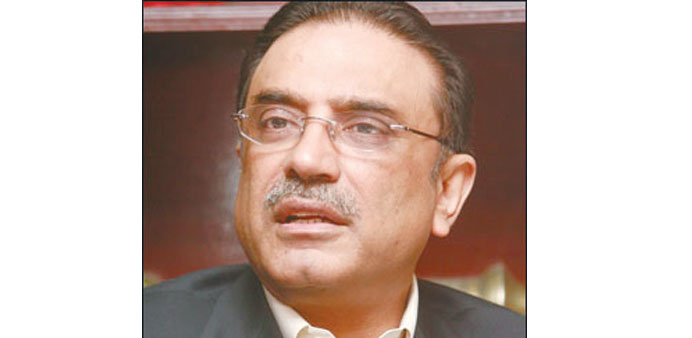|
|
Pakistani President Asif Ali Zardari will visit Iran on Monday for the groundbreaking of a much delayed $7.5bn gas pipeline from Iran to Pakistan, Islamabad announced yesterday.
It will be Zardari’s second visit to Iran since February 27 and comes after officials said a consortium would start work on the pipeline on Pakistani territory on March 11 despite American warnings of possible sanctions.
“President Zardari will visit Iran for the groundbreaking ceremony and it will take place on March 11,” foreign ministry spokesman Moazzam Ahmad Khan told reporters in Islamabad.
He did not give further details but a senior Pakistani official told AFP that the ceremony would be held on the Iran-Pakistan border.
Pakistan suffers from a crushing energy crisis, but the United States says it has offered Islamabad alternative solutions to help avoid sanctions.
“We are not in a fix... we are very clear about it that the pipeline is in our national interest being an energy deficient country,” Khan said.
“Yes we know about their concerns but hope our friends, including the US, will understand our economic compulsions,” said Khan.
Officials have said Monday’s ceremony will mark the start of work on the 780-km pipeline earmarked for the Pakistani side of the border, which is said to cost some $1.5bn.
Although the pipeline on the Iranian side has almost been completed, Pakistan has run into repeated difficulties, both in financing the project and over a US threat of possible sanctions due to Iran’s nuclear activities.
Iran eventually agreed to finance a third of the costs of laying the pipeline through Pakistan, with the work to be carried out by an Iranian company.
Pakistan has made it clear to the United States that it would complete the venture come what may, even at the cost of US sanctions because the project was really important for Pakistan to meet its energy requirements.
The Obama administration has repeatedly warned Islamabad in recent weeks that the project is tantamount to violating American restrictions on major financial deals with Iran that were imposed as part of American efforts to make Tehran abandon its nuclear programme.
According to well-informed Foreign Office circles in Islamabad, Pakistan has at last responded to the repeated warnings from the Obama administration about imposition of harsh sanctions if it goes ahead with the project.
Pakistan has made it clear to Washington through the highest diplomatic channels that it was least bothered about the US sanctions and would complete the project at all costs mainly because it was in its larger national interest.
“We are ready to face economic sanctions for the sake of the people of Pakistan, even though we still believe that the IP project is beyond the scope of relevant UN resolutions which we are obliged to comply with like all other member states,” said a senior Foreign Office official, pleading anonymity.
Currently, Iran is under at least three layers of sanctions that include four rounds of United Nations sanctions, the European Union sanctions and bilateral sanctions by the US, Canada, Australia, Switzerland and Japan. The US State Department warned last week that the pipeline could attract sanctions.
“It’s in Pakistan’s best interests to avoid any sanction able activity, and we think that we provide and are providing a better way to meet their energy needs,” said the State Department spokesman Patrick Ventrell.
But dismissing the American opposition, President Asif Zardari made it clear on March 2 during an interaction with the mediapersons in Lahore that no power in the world could halt the project.
Asked about the US opposition to the project, the president said Pakistan was a sovereign and independent state and that it would go ahead with the project which was originally conceived by Benazir Bhutto in 1993.
While Pakistani officials have defended the gas project with Iran on several occasions, it was the first time that President Zardari announced his explicit support to the project.
During his meeting with President Zardari in Tehran last week, the Iranian President Ahmadinejad too brushed off the American pressure on the pipeline project, saying the United States cannot affect the project and the gas will reach Pakistan as per the plan.
Advising Pakistan in January 2010 to stay away from the pipeline venture, the Obama administration had offered assistance to Islamabad for a liquefied natural gas terminal besides aiding the import of electricity from Tajikistan through Afghanistan’s Wakhan Corridor.
But the PPP government turned down the US offer and decided to go ahead with the IP, which is also known as “the peace pipeline”.

